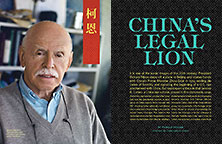To fully understand China, Cohen believes it is necessary to study neighboring countries that share China’s Confucian-Buddhist heritage. So only months after visiting China for the first time in 1972, Cohen wangled a visa and became the first American academic to visit North Korea, taking his family with him. “I always believed that a lot of the American propaganda about North Korea was exaggerated,” says Cohen. “Unfortunately, I learned it had a factual basis.”
When the Cohens arrived in North Korea, they were squirreled away to a remote estate with armed guards and were only allowed to visit museums and other public spots after they were emptied of North Koreans. “We were essentially under house arrest,” Cohen’s son, Ethan, then 11, remembers. (Since Beijing was a main route to North Korea then, the family also visited China on that trip.)
It wasn’t until 1997 that Cohen was invited back to North Korea. He has since brought over a North Korean delegation to speak at the Council on Foreign Relations, where he is an adjunct senior fellow, and he—along with NYU Law Professor Stanley Siegel—has taught North Korean officials the basics of international business law in Beijing. “I’ve always felt that we should bring North Korea into the world, just as we did with China,” he says.
Cohen’s experience with South Korea, however, was even more dramatic, as he intervened in the Korean Central Intelligence Agency’s (KCIA) audacious kidnapping of Kim Dae-jung, a friend of Cohen’s and a South Korean activist who later became one of the country’s most revered presidents and won the Nobel Peace Prize in 2000. In August 1973, Cohen received an urgent call from Kim’s U.S. aide, saying Kim had been kidnapped in Tokyo by KCIA agents and would be killed. Would he call President Nixon’s aide Henry Kissinger for help? Cohen says he did, and that Kissinger promised he would do everything he could.
A few hours later, Kim reportedly was on a boat, bound, blindfolded, with weights attached to his wrists, about to be dropped into the sea to die, when suddenly he heard shouting and a mysterious aircraft overhead. Kim was subsequently released in Seoul.
Press reports credited then-U.S. Ambassador to South Korea Philip Habib for warning South Korea’s president that he would face the U.S.’s wrath if Kim were killed. Kissinger hasn’t publicly discussed his role. Even Cohen isn’t sure what action Kissinger took, though he says Kim later told a Korean magazine that the appeals to Kissinger made by Cohen and Edwin Reischauer, a noted Harvard Asian studies scholar and former U.S. ambassador to Japan, helped save his life. Indeed, the Kim Dae-jung Presidential Library and Museum in Seoul plans to display Cohen’s recollections of his role. Kim died in August.
—
